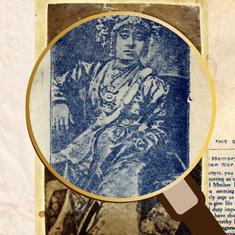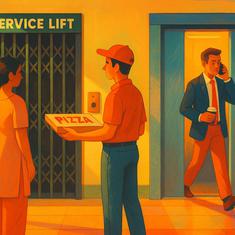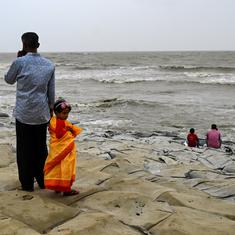If you have visited Sikkim and taxied in the “cushioned unity” of a crowded jeep , with Nepali music backdropping a boisterous gang of local strangers, you’ve lived a story by Chetan Raj Shrestha. If you have read his published fiction – The King’s Harvest, a suite of novellas, and The Light of His Clan, a novel – you’ve lived the state’s complex realities.
In the 38-year-old Gangtok-born writer and trained architect, the Himalayan state has found a voice to tell its stories. Its past, present and everything in between – even the hush-hush bits from the cobwebs of history which no longer figure in dinner time conversations. Skilfully weaving facts with fiction, Shrestha portrays Sikkim in all its Himalayan grandeur and with all its flaws – corruption, caste-system, domestic violence – manoeuvring himself through societal fault lines. He writes with the unsentimental fondness of a local boy who loves the place but is not blind to its shortcomings.
Shrestha won the Tata Literature Live! First Book Prize for The King’s Harvest (Aleph Book Company) in 2013. It contains two novellas – Open and Shut Case and The King’s Harvest – both set in Sikkim. The first follows a policewoman’s investigation into an “open-and-shut” case – on New Year’s Eve, a woman chops her police constable husband into 47 pieces and surrenders at the police station. The second one describes the journey of a pig-eared man who sets out, after being isolated for three decades in an Arcadian enclave owned by the king of Sikkim, to emerge into the Sikkim of today to demand that the monarch come and collect his portion of the harvest.
Shrestha followed this up two years later with a novel, The Light of His Clan (Speaking Tiger Books), published in November 2015. A satire in the Horatian style, it traces the last days of a clan leader, an ex-minister of Sikkim, and his struggles with old age and deceit.
Shrestha spoke to Scroll.in over a series of encounters on phone and email, from Sydney, where he currently lives and works as a conservation architect. Excerpts from the interviews:
The tiny state of Sikkim is the setting for all your work so far, including short stories published in local magazines. It’s not just a backdrop, but almost an all pervasive character influencing the goings on. Why?
It was what I knew best and I found that I could write about it with ease. More importantly, I had an outlet. I would write and the editors of local papers and magazines would publish it and I received instant appraisal from local readers. It was a simple circuit, but also a priceless one, for nothing provides better nourishment to a young writer than being read.
That feeling has never quite gone away. Because Sikkim is small, and its realities are graspable, it can behave like a character, if that makes sense. And the fact that its terrain is so distinct gives the character an added and invaluable dimension.
Your characters – how derivative are they of real people that populate your world?
Not at all. I consciously avoid situations where I will be accused of slander, a constant possibility in a circumscribed place. I keep encountering readers who assume that a character is based on a local figure. Some of the inferences are quite shocking. I then have to plead with the readers not to broadcast their assumptions. On a serious note, I describe what I see, and the only liberties I take are to accentuate the sharper edges. Characters should be composite, like rooms which are accessed through many keys instead of just one.
Politics in all its hues is a dominating theme, especially in The Light of His Clan. How much are you influenced by politics for your fiction?
I played with fantasy in The King’s Harvest, but my roots are realist. In The Light of His Clan, I wanted to describe Sikkim as I have experienced it as an adult. I returned home and worked in a self-established architectural practice between 2009 and 2014, doing much of my work for the government.
Now, the government in Sikkim employs a fifth of the adult population, and coupled with disbursements and schemes, for it is also the primary industry, it supports a little over four fifths or eighty percent of the population. I don’t know of anywhere in the world where these kind of statistics occur. You can’t escape the government, and by extension, you can’t escape politics. I wanted to bring out the claustrophobia induced by such a situation in The Light of His Clan.
But even as you are critical of politics, you cloak your criticisms in literary devices and techniques. You are not confrontational or antagonistic. You are rather mischievous with your use of satire and humour. Your high-caste fictitious Chandanths – we know whom you are talking about – celebrating the backward-class status given by the government, or seeking a ban on the sale of chicken meat, for example.
My priority remains literature. Politics passes and any work that describes its times too closely also runs the risk of obsolescence. The sense of mischief is something I’ve probably inherited from my father’s side of the family. It’s the skill of chhadke hannu (striking someone obliquely, literally translating from Nepali), to make a point and draw laughs at the same time.
I had to invent a new people in The Light of His Clan, again partially to avoid a distracting notoriety and more importantly, because caste politics, not just in Sikkim, but throughout India follows similar templates. The political successes of one caste are emulated by another, so in that at least they have all levelled. I wanted to explore that and see where it took me.
Sikkim’s political realities are quite complex for such a small place: there is no dominant homogenous group. It seems to be a collection of minorities and this accounts for a lot of intrigue and negotiation. In a lot of ways, it reflects the political realities of modern India. Though thankfully, Sikkim’s version is devoid of any physical violence, and I hope it stays that way.
One criticism of your work is that the stories are very “local”, and you do not footnote. Does it not bother you that many readers, reviewers included, especially those who don’t know Sikkim enough, are not be able to sift through the layers of your stories, or get those jokes?
A confession. I’m quite open to footnoting, not as intrusions on every page, but at least a glossary. It was my publishers who were more radical and they dissuaded me. And I can see their point. It’s the difference between showing and explaining, I guess.
And there’s no rule that everyone must understand everything in a book. I’ve been reading books set in England since my childhood, and I still have not figured out the British pound system, all those nickels, guineas, shillings, dimes, etc. All I can infer is if something was cheap or expensive and that’s quite enough I think. Precision of understanding in fiction is an insider’s privilege, and it must be taken as such.
You made your debut in the national publishing scene with novellas. If that was not experimental enough, you don’t seem to care much about the formulaic writing that has begun to characterise English literature from the subcontinent.
The first novella was more an accident than design. The Open and Shut Case began as a short story but it was a potent story, asking to grow. So I worked on it, with my editor’s encouragement, and it settled at 32,000 words. Then I wrote The King’s Harvest to complement it. I’m surprised the novella isn’t a more popular form: it takes less time to write but still allows enough exploratory space.
I don’t consider myself an experimenter. The appearance of the absence of formulas might be entirely because of their subject matter. Both books were non-urban. Much of recent Indian fiction in English is urban and it’s not surprising, because there is a concentration of ideas, people and resources. But all pleasures have their risks, and urban experiences, at least for the demographic writing in English, tend to be similar, and cultural details get abraded because there is a pressure to assimilate.
What is the relation between your reading and writing habits? Do the books you read while writing influence the work?
I’m picky with my books. Among the good books I’ve read this year are Memoirs of a Fox Hunting Man by Siegfried Sassoon and My Childhood by Maxim Gorky. I enjoy history, and have just finished Anthony Beevor’s Downfall. Among the books that I’m reading right now are Bombay, Meri Jaan, a collection of vignettes on Bombay, Stephen Crane’s The Red Badge of Courage and I’m trying very hard to get into Cormac McCarthy’s All the Pretty Horses. Friends from Kathmandu sent me two issues of La.Lit, an exceptional literary magazine they edit. They just arrived and I’m looking forward to them.
There ought to be a pattern between reading and writing habits but I cannot find any. I tried opposites: reading non-fiction while writing fiction and vice versa, but temptations get in the way, and you find yourself picking something you shouldn’t be reading and saying, “A good book is a good book.” I also tried rereading old favourites but the writing runs the risk of becoming imitative. And speaking of old favourites, I reread Ha Jin’s In the Pond recently. It’s a novel set in China’s provincial bureaucracy and is a bawdy ode to the virtues of pig-headedness.
Does your training in architecture help anyway in your writing?
Architecture has made me more visual. I find I am attracted to tangibles and am suspicious of abstractions. Though this may not be entirely a good thing, for these can negate interior processes of characters and narrations, and these are the actual engines of good fiction.
But both are design processes, and I’ve noticed that the best specimens of both tend to have a strong and distinct impulse at their cores. Concepts may not be everything, but it is the initial mould which shapes the final piece.
Nowadays there’s a lot of pressure on authors to promote their books. You don’t betray any zeal, or compulsion, for it. Why?
I would love for my books to sell more, but that propulsion has to come from the books. And I don’t have a gift for publicity. Self-promotion is like drum-beating: anyone can do it but you have to like the noise to do it well. I work full time, I value my sleep, and the few hours I have left, I have to divide between writing and praising my wife. Self promotion would eat into all of these.
What are you writing currently? What is it on? Who’s publishing it?
I’m working on a collection of short stories set in Sikkim and I’ve completed a few of them. And I’m also gradually encircling a theme that will perhaps turn out to be a novel. I haven’t spoken to publishers yet, because I do not want to write for deadlines, external or self-imposed.












